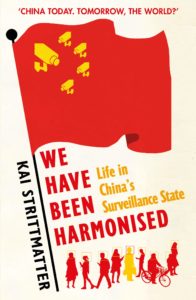Book Review: We Have Been Harmonized
Tim McQueen

We have been harmonised – Life in China’s surveillance state
Kai Stittmatter
Old Street Publishing. 328 Pages.
This is not the usual type of book reviewed in PC Update. However, in the light of recent publicity of China’s activities in Australia, and particularly the Victorian government’s MOU with the One Belt, One Road plan, and the book’s emphasis on the great firewall, mass surveillance and artificial intelligence, it canvasses essential information for Melb PC members.
Kai Stittmatter is a German journalist who has spent more than thirteen years as a correspondent in Beijing. He has written several books on China.
In his preface, New China, New World, Stittmatter outlines how today’s China has eliminated the China we once knew and how Xi Jingping as leader for life has restored the Chinese Communist Party to the apex of Chinese life. The Party, therefore Xi, controls the State and the people. History is rewritten to Party requirements. The Party controls education from kindergarden to University and beyond. He quotes one parent who suggested taking a child to Europe for a birthday celebration. The child didn’t want to go – why should he spend his birthday anywhere but his motherland that has given him everything he needs?
Stittmatter notes how Xi positions himself as a Maoist and Marxist, but is actually closer to a Leninist. There is no need for direct application of terror; the implicit threat is usually sufficient. When people can disappear without warning, even from outside China, and reappear helping police and ultimately making humiliating public confessions, caution in speech and action is advisable.
He outlines how the Party redefines words: democracy and harmony mean freedom to do as the Party decides without rocking the boat. Propaganda is pervasive.
Remember when we thought that the Internet would open China to the world? The reverse is happening. China’s internet is really a gigantic intranet. The major American technical companies have been complicit in this transformation, allowing censorship to be distributed rather than centralised and assisting in filtering search results. China’s tech giants employ tens of thousands of censors who rapidly take down anything the Party disapproves of. They are also influencers, and flood forums with pro-Party opinions when doutbtful posts appear. China has more smartphones per capita than anywhere else; the most used apps are Chinese and maintain the thought bubble the Party wants. The CEOs of the Chinese tech companies may be billionaire entrepreneurs, but they are also Party members.
Young Chinese have the tools, ability and talent to use VPNs to tunnel through the great firewall; they just don’t want to. As with the child above, they can do and find everything they think they need in their comfortable environment. Given appropriate incentive they can explore outside and may become aware of the wider world.
Stittmatter discusses the pervasive surveillance throughout China, especially Xianjiang, and how visual data can be linked to other data through Artificial Intelligence. Chinese companies may be behind America in the development of AI, but they have huge investment and little restriction on the collection and application of big data. Police can predict where people are gathering by analysing pedestrian traffic flows, and conversely spot anybody going against the flow. Stittmatter looks at the social credit system that is gradually being rolled out across the country. Access to loans, jobs and transport can be restricted for people without sufficient points. Points can be deducted fo associating with others with low credit.
He also looks at China’s influence in the world. The Confucius Institutes established in universities, including here in Australia, are under direct Party control. In some countries they have control over curriculum and lecture content. There are several instances of companies, including Cambridge University Press, self censoring to avoid offending Chinese sensibilities.
Finally, he turns to the future. Will China overtake the West and surge ahead to lead the world? That depends on China’s strength against the West’s weakness. We need to re-invigorate democracy.
This is a fascinating read. Unfortunately, the book doesn’t have an index, and the council library copy I reviewed is poorly bound with pages coming out in normal reading.